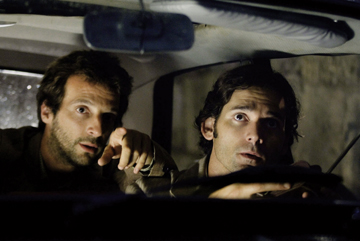 Mathieu Kassovitz and Eric Bana stake out their next intended target in ’Munich.’
Mathieu Kassovitz and Eric Bana stake out their next intended target in ’Munich.’
|
| Munich\r\nStarring Eric Bana and Daniel Craig. Directed by Steven Spielberg. Written by Tony Kushner, based on George Jonas’ book. Rated R. |
|
A D V E R T I S E M E N T
|
|
|
|
A D V E R T I S E M E N T
|
|
Black Ops
Steven Spielberg ponders Arab terrorism in a brilliant historical thriller.
By KRISTIAN LIN
Four years after the 9/11 terrorist attacks, a welter of films this year have tried to fathom why people blow themselves up — Hany Abu-Assad’s Paradise Now, Joseph Castelo’s The War Within, and Stephen Gaghan’s Syriana. Inspired by the same angst, Steven Spielberg’s Munich poses a different question: How does a government deal with the people who are willing to blow themselves up? The resulting plus-size film comes up light on answers, but in terms of visceral impact, it easily outdistances the others.
The film begins with the murders of 11 Israeli athletes at the 1972 Summer Olympics in Munich. In Jerusalem, Prime Minister Golda Meir (Lynn Cohen, a natural fit for the part) authorizes a team of Mossad agents to eliminate 11 leaders of Black September, the group that masterminded the attack. The mission is so secret that the agents have to officially resign from Mossad to maintain Israel’s deniability, yet the government wants high-profile killings, carried out with bombs instead of guns. Led by Avner (Eric Bana), a young idealist with a wife and baby at home, the team crisscrosses Europe, assassinating their targets methodically though not always efficiently. After their first few successes, the team members themselves are targeted by Palestinians, KGB, CIA, and freelance killers for hire, and an increasingly paranoid Avner wonders whether he’s being sold out by the French contact (Mathieu Amalric) who’s giving him the locations of the Black September guys.
Written by Tony Kushner in his first screenwriting effort, the script is based on Vengeance, a controversial book by Canadian journalist George Jonas that uses the anonymous testimony of a Mossad agent who supposedly took part in the real-life campaign against Black September. The film has drawn fire from Israelis for extending sympathy to the Palestinians. Indeed, Spielberg and Kushner are even-handed enough to include a scene in which Avner and his men find themselves sharing a safehouse with PLO fighters and pass themselves off as Basque radicals to keep from being shot. Avner’s prickly but civil conversation with a Palestinian named Ali (Omar Metwally) draws out a remarkable speech about the importance of having a homeland. (What makes the scene is Al Green’s honey-tinged “Let’s Stay Together” playing in the background, the result of the Israeli agents and Palestinian guerillas squabbling over which radio station to listen to.)
The movie never loses sight of the initial outrage that fuels these men and their government — the Olympic hostage crisis serves as a framing device for the story, and the staging of the athletes’ murders doesn’t stint on the brutality of their deaths. Yet as the body count rises, the Israeli agents find only complications and detours in their quest for payback, and their targets are only replaced by more extremist and more violent terrorists. The assassins even wind up wondering whether the people they’re killing are the ones responsible for the original attack. The movie asks, what did Israel’s campaign of revenge accomplish? Did it make their country any safer? These questions are worth asking, but did it take a 165-minute film to raise them? Of course, there are no easy answers — still, you’d expect these filmmakers to come up with more than they do.
The characters aren’t quite strong enough to carry the movie, either. The five members of Avner’s team are about as hastily sketched as the soldiers in Saving Private Ryan, though the actors — Daniel Craig as the gung-ho trigger man, Hanns Zischler as the balding foot soldier, Mathieu Kassovitz as the dangerously sloppy bombmaker, and Ciarán Hinds as the wonkish cleanup guy — play together with a cohesiveness that’s impressive given that they’re all from different countries. (None of which happens to be Israel, which is a problem only at times such as when the Northern Irishman Hinds is required to say, “If I can’t kvetch, I can’t do my job.”)
Munich works best as an international spy thriller, thanks to the director’s unfailing instincts for tension and suspense. Spielberg delivers any number of crackling action sequences, from a massive shootout in Beirut to a bombing that the agents frantically try to abort when they realize that their intended victim’s young daughter will be caught in the blast. (Twenty years ago, Spielberg would have let the little girl live every time. Now, you don’t know.) The ghoulishness of the agents’ mission is repeatedly brought home, especially during a hit in Holland that leaves a naked young woman stumbling around her house, with two tiny bullets inside her killing her slowly. This movie may not be the all-encompassing statement on our post-9/11 world that its makers intended, but it’s still a solid piece of entertainment, and that makes its larger ambitions go down easily.
 Email this Article...
Email this Article...

